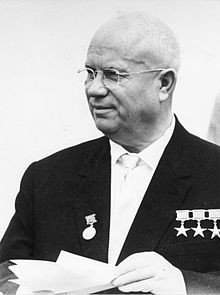Khrushchev (1953-64)
Nikita Khrushchev 1953-64
Image

Collective leadership after Stalin’s death
- 1953 appointed Communist Party secretary
- 1958 appointed Prime Minister
- Believed Soviet rule should be based more on consent than terror
- Khrushchev increasingly became dominant figure of party
- Marked by 1956 ‘Secret Speech’ at Communist Party Congress
- Put forward policies
- Peaceful coexistence with West
- Increase production of consumer goods and light industry
- Criticised Stalin’s extreme methods
- Blamed all mistakes on Stalin
- Denounced ‘Cult of Personality’
- Condemned excess terror used to force conformity of public
- Did not criticise Communist Party, only Stalin
- Marked beginnings of De-Stalinization
- Reasons for De-Stalinization
- Gain support from West
- Distance self from Stalin’s brutality
- To bring drastic economic changes through ‘reform communism;
- Lost support of Communist China who believed was opening up to West and denouncing Communism
De-Stalinization
- By 1958 8 million political prisoners had been released from Gulags
- Those killed under Stalin were declared innocent
- Reduced powers of Secret Police
- Stalingrad was renamed Volgograd and statues removed
- Removed Stalin’s body from Lenin’s Red Square mausoleum and buried in pit filled with concrete
- Reduced censorship and allowed production of works critical of Stalin’s reign
- Less central planning of industry
- Allowed freedom of movement abroad
- Freedoms allowed spread of opposition both internal and external
Removal of internal opposition
- Criticism of admired Stalin caused internal party opposition
- Molotov, Kaganovitch and Malenkov won decision from Praesidium to abolish position of First Secretary and therefore remove Khrushchev’s power in party
- Khrushchev’s appointed members in Central Committee easily overturned decision
- Khrushchev had opposition removed from Praesidium - similar to Stalin removing opposition to maintain power - However, refrained from using terror
Removal of external opposition
- Demands from nations under Soviet rule for independence
- Poland strikes – allowed freeing of anti-Stalin Gomulka and promotion to Polish president
- Supported Yugoslavia’s Independent Communist Government
- Anti-Soviet demonstration in Hungary during Liberal Communist reign
- Khrushchev used excessive force by sending army and tanks to crush rebellion
- Destalinisation did not mean reduction of USSR’s protection through allowing freedom of strategic satellite states
- Demolished more Orthodox Churches – also Jewish and Muslim places of worship
Industrial reforms
- Removal of FYP to be replaced by emphasis on consumer goods – clothes, bikes, watches
- High targets at start similar to FYP
- Did not achieve targets only in few areas such as motorbikes
- Called for growth of chemical industries to provide fertilisers for agriculture
Administrative reform
- Inefficient local ministries closed
- Replaced by Sovnarkhozy – regional economic councils running local economy separately
- Khrushchev able to remove opposition
- Created further bureaucracy and complexities to system
- No one knew who was in charge and created anarchy
- Housing shortage was addressed through house building – 50 million re-housed by 1965
- Increase in real wages, welfare spending and reduction of working hours to 7 gave many better existence than ever before
- Technological advances – Space program 1st man and satellite in space
- However, took funding away from domestic policies and left many living in poverty
Agricultural reform
- Khrushchev believed he was an agricultural expert having worked as a young man on land
- Blamed failure of agriculture on high taxes for collective farms and low prices received for goods
- He increased prices for goods, cancelled debts to government and cut taxes
- Encouraged growth of grain to feed livestock and leave spare grain
- However, maize unsuitable for climate and many crops failed
Virgin Land Scheme
- Proposed large areas of unused land should be cultivated using mass labour and army conscripts
- Army used to control workers and force acceptance of scheme
- By 1956, 35.9 hectares of virgin land cultivated and crop output increased
- Intensive farming, unsuitable soil and crops and poor weather conditions resulted in declining output after 1958
- Poor planning and still lack of transport system led to many crops rotting after failure to be transported
- Had to purchase large amounts of grain from USA to stave of famine in 1963
- Left Russia humiliated as Khrushchev had promised Virgin Land Scheme would make Russia superior grain producers to America
Why he fell from power
- Disastrous agricultural policies
- Consumer goods sacrificed for arms and space race – split nations loyalty
- Russia left pauperised by excessive spending
- Arrogant and failed to listen to others or learn from previous governments mistakes – Virgin land scheme attempted under tsars
- Almost made ‘Cold war turn Hot’ after Cuban missile crisis
- Forced to remove Russian nuclear weapons appearing weak compared to USA
- Decline in relations with China over denunciation of Stalin
- Contradictory policies
- Originally stated peaceful coexistence
- Later fuelled Cold War with nuclear arms
Propaganda
- Used by Khrushchev to spread ideology
- Photos taken of industrialised agriculture shown around world
- Used to heighten own position as well as spread communism
- Publications denouncing Stalin allowed – showing separate from Stalin and to encourage foreign relations with West
